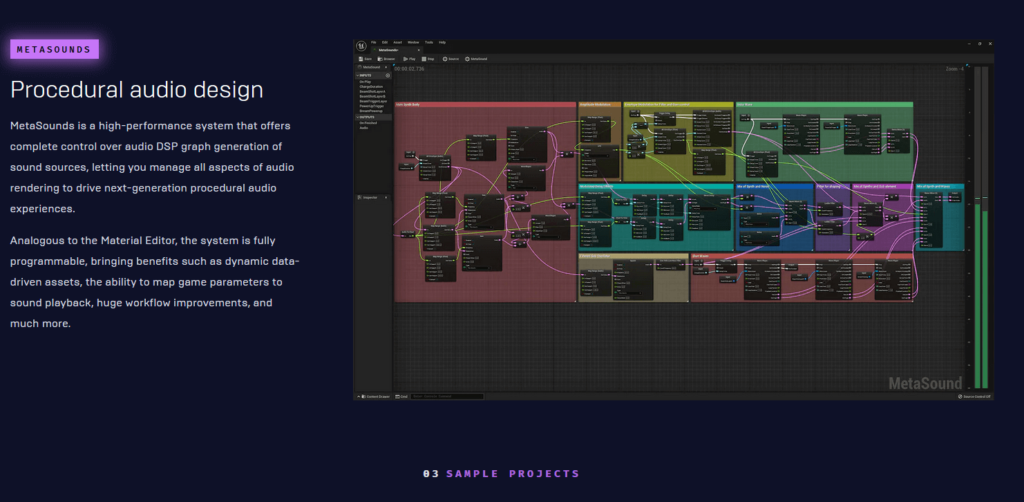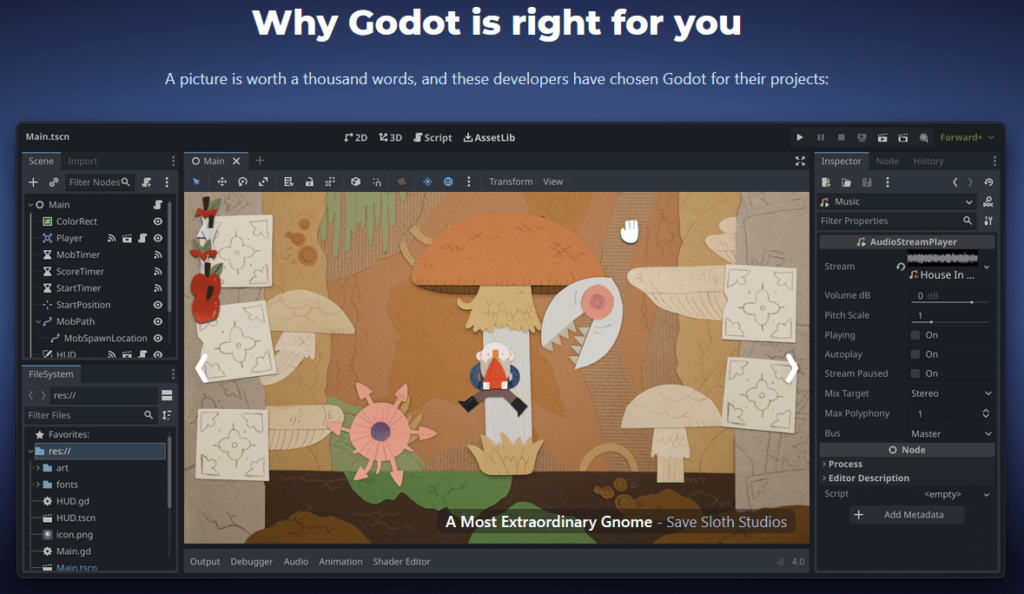In this guide, we will explore some of the Best Video Game Engines of 2023, offering insights into their features, capabilities, and how they stack up against each other. Choosing the best gaming engine for your game might seem like an unimportant decision if you're not immersed in the world of game development. However, for those who live and breathe gaming, it's clear that the best video game engine can make or break a project. The gaming landscape in 2023 is teeming with incredible technologies, and standing out requires the right tools. So what is the best video game engine for game developers? Let's dive in!
Understanding Game Engines
A game engine is the heart of game development. It's software that combines all the essential elements needed to create a game, from initial ideas to final touches. The best game engine offers functionality to cover every phase of development, ensuring a smooth and efficient process.
Key Factors to Consider When Choosing the Best Video Game Engine for Your Game

The range of game engines available today is vast, so finding the best gaming engine for your game requires careful consideration. Here's what you should think about:
- Type of Game: Whether you're working on a visually stunning 3D masterpiece or a simple 2D platformer, the genre, visual style, complexity, and mechanics of your game will guide your engine choice.
- Features and Capabilities: Each gaming engine offers unique features that might align perfectly with your game's needs. Whether you need top-notch physics handling, striking VFX, or seamless multiplayer support, finding the engine that specializes in these areas can transform your game.
- Target Platform: Different game engines cater to different platforms. Some focus on mobile development, some offer multiplatform support, and others are tailored to specific systems like Nintendo Switch.
- Budget Considerations: Licensing fees for gaming engines vary, so keep them in mind when planning your budget. Additionally, consider the programming languages supported by the engine, as hiring developers skilled in those languages may impact costs.
- Development Team's Experience: The best video game engine for a game developer might be the one they're already familiar with. If your team has extensive experience with Unity but your game seems better suited for Source, sticking with Unity might be wise. The time saved on a familiar platform can outweigh the benefits of switching.
How can you identify the best game engine for your game in 2023? With numerous options available, we'll guide you through some of the major game engines to find the one that fits your needs. Let's move on to explore some specific engines and see how they measure up!
Unity 3D: A Powerhouse for Game Development

Unity, a C#-based engine, stands as the world's most-used game engine, powering a vast number of games on platforms like Steam. It's a favorite among mobile game developers and indie studios, thanks to its user-friendliness and affordability.
- Features and Capabilities: Unity shines in its 3D world-building tools, animation creation, streamlined workflows, and non-code editing options. Its rich toolset ensures developers have everything they need in one place.
- Pros:
- Vast Asset Store: Unity's Asset Store is a treasure trove of tools, supported by comprehensive documentation and a vibrant professional community.
- Fast Development: Unity's intuitive patterns and prototyping features expedite the development process.
- Porting Made Easy: With specialized tools, Unity makes it seamless to bring games to different platforms.
- User-Friendly: Unity is renowned for its ease of use, making it a perfect starting point for aspiring game developers.
- Robust Community: A massive user base ensures a wealth of shared knowledge and community support.
- Cons:
- Quality Control Issues: Unity's accessibility means it's possible to create subpar builds, leading to potential optimization challenges later on.
- Lacks Flexibility: Certain features in Unity may be challenging to scale or modify, making it less suitable for larger-scale games.
- Visual Limitations: Compared to other engines, Unity's tools for lights, shaders, UI, and art-related features might feel limited.
- Pricing: Unity is free for students and individual developers with less than $100K in revenue or funding over the past year. Paid options begin at €170/month per seat.
- Popular Games Made with Unity :
- Rust
- Firewatch
- Pokémon GO
- Cuphead
- V Rising
Unity's position as one of the best video game engines for game developers remains unchallenged, especially for those focusing on mobile or indie projects. Its pros and cons weigh differently depending on the scope and requirements of your game, but Unity's accessibility and support make it a strong contender for many. Let's continue to explore other engines to help you find the best gaming engine for your unique needs!
Unreal Engine 5: A Robust Choice for Ambitious Projects

Unreal Engine, developed by Epic Games and rooted in C++, is another prime candidate as the best video game engine for your game. This powerhouse, often recommended at the forefront of game development planning, is celebrated for its flexibility and advanced features. Let's dive into what makes Unreal Engine a compelling choice for many game developers.
- Features and Capabilities: Unreal Engine's extensive toolset includes Blueprints visual scripting, real-time world creation, and state-of-the-art light and shadow technologies like Lumen and Nanite Virtualized Geometry. The recent Unreal Engine 5.2 update introduced enhancements to the Procedural Content Generation framework, Substrate material authoring, and more.
- Pros:
- Blueprints Functionality: This drag-and-drop interface, known as Blueprints, empowers non-programmers to develop and experiment, often cited as proof of Unreal Engine's status as one of the best game engines.
- Friendly Monetization Model: You can use Unreal Engine for free until your project reaches $1,000,000 in revenue, at which point you pay a 5% royalty. Free licenses are also available for creators without publishing needs.
- Rapid Prototyping and Iteration: Unreal Engine 4 (UE4) offers quick prototyping and iteration, enabling the exploration of ideas and understanding of feasibility.
- Versatility: Unreal Engine has the capacity to tackle projects of any genre and platform, making it a highly adaptable choice.
- Scalability: Ideal for large-scale projects, Unreal Engine can handle vast scenes and numerous actors with ease.
- Cons:
- Demands Technical Expertise: Proper development with Unreal Engine requires in-depth knowledge of C++ and careful attention to data usage.
- Pricing: Unreal Engine offers a free option for educators or creators who don't need premium support. Licenses start at $1,500 per seat/year.
- Popular Games Made with Unreal Engine:
- Fortnite
- Hogwarts Legacy
- ARK: Survival Evolved
- Final Fantasy VII Remake
- Star Wars Jedi: Fallen Order
Unreal Engine's exceptional flexibility and blueprint system position it as a robust option for both small and large projects. It's scalability and unique features can be key factors in selecting Unreal Engine as the best gaming engine for game developers looking to take on ambitious ventures. With an appealing monetization model and an open-source perspective, it's a strong contender in the landscape of gaming engines, worthy of serious consideration in your decision-making process.
Godot: The Open-Source Marvel for 2D Development

With the recent release of Godot 4.0, this once-niche engine has surged in popularity, emerging as a robust alternative in the open-source community. Built on C++ and C, Godot is heralded by many as the best video game engine for 2D projects. Let's delve into what makes Godot an intriguing choice:
- Features and Capabilities: Godot 4.0 has revamped its 3D & General Rendering capabilities, incorporating Vulkan and enhancing lighting, shadows, mid- and post-processes. The support for more shader languages, along with a new Shader Editor, is a commendable addition. Godot's improvements in 2D game development, scripting, physics, optimization, and extended reality games are noteworthy.
- Pros:
- 2D Excellence: The engine's 2D capabilities are particularly renowned. Many consider it the best video game engine for 2D game developers, thanks to its pixel-based native measurements and vibrant community.
- Unbounded Versatility: Godot users often laud its virtually limitless possibilities. Whether it's a 2D pixel art project or an ambitious indie title, Godot's tools are more likely to empower than restrict.
- Absolutely Free: With Godot, what you see is what you get — and it's all free. Donations are appreciated, but the engine, documentation, tutorials, and source codes are available to everyone.
- Cons:
- 3D Limitations: While Godot offers basic 3D tools, it lacks the power and features found in other engines, particularly for 3D-level design and rendering.
- Some Missing Features: The absence of certain standards like a sprite editor, occlusion culling, and particle attractors might deter some developers.
- No Console Support: Godot's open-source nature precludes direct console development. While not impossible, console deployment requires third-party involvement.
- Pricing: Godot is entirely free, provided you comply with their licensing requirements.
- Popular Games Made with Godot:
- Blasttonsut
- Lumencraft
- Nightmare In Squidville
Godot's commitment to versatility, 2D excellence, and open-source accessibility makes it an appealing option for game developers, particularly those looking to explore new horizons without breaking the bank. While it may lack in some areas compared to the bigger names in game development, Godot's strengths, especially in 2D gaming, make it a worthy contender in the quest for the best video game engine for game developers in 2023.
CryEngine: The Powerhouse of Physics and Visual Realism

Famed for its capabilities in rendering advanced AAA games, CryEngine, coded in C++, is the go-to option for developers seeking to create expansive worlds with complex mechanics. If physics, intricate ballistics, stunning graphics, and open-world mechanics are central to your project, CryEngine is worth a close look.
- Features and Capabilities: CryEngine’s claim to fame lies in its realistic game worlds and mechanics. If your game demands advanced interactions with physics, gravity, and graphics, CryEngine's robust toolset has much to offer.
- Pros:
- First-Person Gaming Excellence: Famous for hosting a multitude of dynamic environments, spacious levels, and open-world mechanics, CryEngine shines in the first-person gaming realm.
- Advanced AI Programming: Create intelligent and dynamic NPCs with powerful AI programming capabilities.
- Sandbox and Animation Prowess: CryEngine's sandbox features and advanced skeletal animations provide photorealistic visuals. Coupled with an optimized rendering system, it competes for the title of the most powerful game engine.
- Rich Physics Toolkit: With features like ropes, destruction, vegetation interactions, buoyancy, and water simulation, CryEngine brings physics to life like a few other engines.
- Cons:
- Hardware Intensive: Expect to invest in high-end hardware to run CryEngine effectively.
- Multiplayer Limitations: There are significant constraints when it comes to multiplayer functionality.
- Comparatively Poor Support: Despite hosting renowned titles, CryEngine lacks the extensive support network enjoyed by Unity or Unreal Engine.
- Genre Specificity: CryEngine is tailored for physics-based first-person games with a slower pace. Attempting more dynamic, fast-paced projects may lead to difficulties due to inherent limitations.
- Not Mobile-Friendly: CryEngine struggles with mobile development.
- Pricing: CryEngine applies a 5% royalty fee, though your first $5K of annual revenue per project is exempt.
- Popular Games Made with CryEngine:
- Hunt: Showdown
- Crysis 3
- Kingdom Come: Deliverance
- Far Cry 3
- Star Citizen
With CryEngine, you're stepping into a realm of unparalleled physical realism and visual sophistication. While its narrow focus and support network may deter some developers, those aiming for high-quality first-person experiences with complex mechanics will find CryEngine a compelling option. If your ambitions align with its capabilities, CryEngine's state-of-the-art technology might just be the perfect partner for your next gaming venture in 2023.
GameMaker Studio: A Gateway to Indie Game Development

With an emphasis on 2D games, GameMaker Studio has become a staple among indie game developers, offering a balance of simplicity and power across a wide range of platforms, including Windows, macOS, Linux, Android, iOS, HTML5, and consoles.
- Features and Capabilities:
- Drag-and-Drop Interface: Ideal for those with little or no programming experience, this feature simplifies game creation.
- Comprehensive Built-in Tools: From graphics to animations, sound effects to music, GameMaker Studio provides all the necessary tools for complete game design.
- Game Maker Language (GML): For those seeking to craft more intricate games, GML offers a potent scripting language.
- Broad Platform Support: Whether you're targeting PC, mobile, web, or consoles, GameMaker Studio has you covered.
- Pros:
- Powerful Capabilities: Despite its beginner-friendly facade, GameMaker Studio houses the robust GML for intricate game design.
- True Cross-Platform Development: Targeting multiple platforms is made seamless, greatly expanding your game's reach.
- Vibrant Community: From tutorials to asset sharing, the active GameMaker community is an invaluable resource.
- User-Friendly: The drag-and-drop interface ensures a welcoming entry point for newcomers.
- Cons:
- Learning Curve: While approachable at first, mastering GameMaker Studio and GML can become complex.
- Performance Concerns: Some users may experience slowness, particularly with graphically intense or physics-heavy games.
- Price: While a free version exists, it is limited, and full access requires a subscription
- Pricing: Options range from Free (with limitations) to various paid plans including Creator ($4.99/month or $49.99/year), Indie, and Enterprise ($79.99/month or $799.99/year).
- Popular Games Made with GameMaker Studio:
- Undertale
- Spelunky
- Hotline Miami
- Forager
If you're an indie developer eyeing the creation of engaging 2D games and want a platform that can grow with you as you hone your skills, GameMaker Studio might be the ideal choice. Its blend of simplicity and sophistication, backed by a lively community, makes it a compelling choice for aspiring developers looking to make their mark in the gaming world.
Lumberyard (Updated: Open 3D Engine): Amazon's Free and Open-Source Game Engine

Update: Lumberyard has been succeeded by Open 3D Engine
Derived from CryEngine and developed by Amazon, Lumberyard has carved out a place in the game development scene as a free, open-source game engine boasting a wealth of features. Although not as renowned as some of its peers, Lumberyard's capabilities and backing by a tech giant like Amazon make it an intriguing choice.
- Features and Capabilities:
- Powerful Graphics Engine: Lumberyard's roots in CryEngine shine through its high-quality graphics rendering.
- Comprehensive Asset Tools: Managing game assets is made easier with a dedicated set of tools.
- Physics and Sound Engines: For realism and immersion, these engines deliver robust functionality.
- Scripting Language: Adding flexibility, Lumberyard offers scripting to craft customized gameplay experiences.
- Cloud-Based Services: Leveraging Amazon's cloud expertise, Lumberyard supports streamlined game deployment and hosting.
- Pros:
- High-End Graphics Capability: Reflecting its CryEngine heritage, Lumberyard delivers visually stunning results.
- Complete Package: From physics to sound, scripting to asset management, Lumberyard covers all bases.
- Cloud Integration: Enjoy the benefits of Amazon's cloud infrastructure for game deployment.
- No Cost Barrier: Being free and open-source, Lumberyard lowers the entry barrier for developers.
- Cons:
- Learning Challenges: Without an abundance of tutorials or documentation, getting started can be tough.
- Less Prominent: Lumberyard doesn't yet enjoy the widespread recognition of some competitors.
- Community Support: Lacking the extensive community of some other engines may limit access to support and resources.
- Pricing: Free, open-source.
- Popular Games Made with Lumberyard:
- New World
- Star Citizen
- The Grand Tour Game
If you're in search of a free game engine with strong graphical prowess and the support of cloud-based features, Lumberyard could be worth considering. However, be prepared for a steeper learning curve and less community support compared to more established engines.
The association with Amazon's cloud infrastructure and the range of built-in features offer a solid foundation, making Lumberyard a viable choice for both indie developers and larger studios seeking a budget-friendly yet powerful game development platform.
Final Thoughts
The landscape of game development is vast and varied, with tools available for creators of all skill levels and ambitions. From giants like Unreal Engine, known for its remarkable flexibility and power, to the beginner-friendly interface of GameMaker Studio, each engine offers a unique set of attributes tailored to different needs and goals. Unity stands out with its best-in-class Asset Store, whereas Godot is lauded for its excellence in 2D gaming. CryEngine's prowess in physics-related features and Lumberyard's integration with Amazon's cloud technology offer distinctive advantages for certain projects.
Choosing the right engine is a pivotal decision, one that could shape the entire development journey. It requires careful consideration of factors such as budget, target platforms, technical expertise, and the specific requirements of the game concept. With so many robust options available, each with its pros and cons, developers are spoilt for choice. Exploring, comparing, and aligning the engine's capabilities with the project's vision could be the first step toward turning a creative idea into a tangible, immersive gaming experience. The golden era of game development is here, and these engines are the catalysts that enable creators to push boundaries, innovate, and contribute to the ever-evolving world of interactive entertainment.
